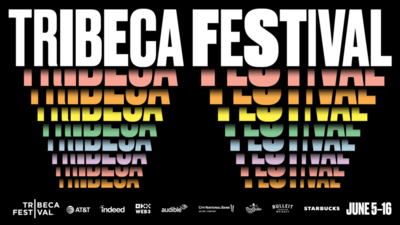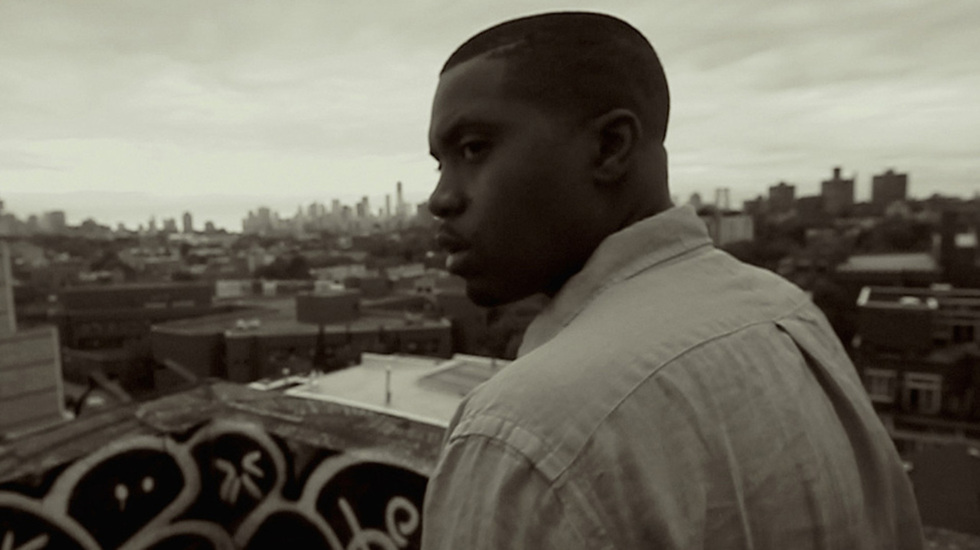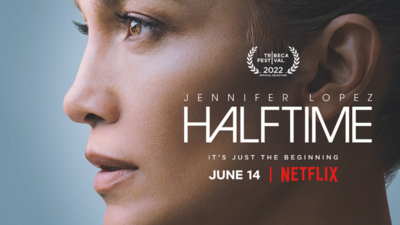
BY KAREN KEMMERLE |
One9 and Erik Parker On Opening TFF 2014 with ‘Nas: Time Is Illmatic’
In this four-part series, filmmakers One9 and Erik Parker provide a behind-the-scenes look at the making of ‘Nas: Time Is Illmatic’ and their reactions to opening the 2014 Festival.

In the second installment of our four-part series on the making of Nas: Time Is Illmatic, One9 and Erik Parker walk us through that momentous night in April of this year when the world premiere of their film opened the 2014 Tribeca Film Festival. The two artists describe getting the phone call that would forever change their lives, meeting Jane Rosenthal and Robert De Niro, and attending the Festival as participating filmmakers.
We were discouraged by the work that was before us. But even in the dark, there was hope.
Tribeca: How did it feel to get the phone call informing you that Nas: Time is Illmatic would open the 2014 Festival?
One9: It was like an electric surge and numbness all at once. I had never made a movie before or been to a film festival. I felt like I was in slow motion. I knew we put our essence into making this film. I was ecstatic about finishing, but never did I imagine getting into a festival, let alone opening the 2014 Festival. I do remember thinking about my father, who passed away a few years ago during the making of the film, wishing he could hear the news. I felt he was a driving force that kept me wanting to finish and finish strong.
Erik Parker: By the time we had finally received a call about opening the TFF, we were like rats running on a wheel. We had been quarantined in our dark office lit only by the flickering final cut timeline of our ever-changing film. We were pretty burnt. We spent overnights in the lab. We would break to eat at a nearby diner—sometimes at 6am—and we would go back or go home and get some sleep and do it again. At some point, we were just rearranging the clips as opposed to making real meaningful changes. The good folks at Tribeca had already visited us and given some feedback on our film. We were discouraged by the work that was before us. But even in the dark, there was hope. So when Genna called us one night as we sat by the computer in our cave, it went like this:
Genna: Hey Erik, is One9 with you?
Erik: Yeah, he's right here.
Genna: You wanna put it on speaker phone? You guys, can you hear me?
One9, Erik: Yeah, we're here.
Genna: Got some news for you. [Dramatic pause] You are going to open the festival.
One9 & Erik: [Screams. Loud.]
It was an amazing moment for us. I wish we had taped it. We literally screamed, not yelled or whooped it up. I remember slapping One9's hand so hard my palm stung. And then we slapped five again. It was some great news for two guys who had forgotten sunlight and began to go delirious, quoting lines of the film to each other for amusement.
Tribeca: If you had to describe TFF 2014 Opening Night in one word, what would it be and why?
One9: ILLMATIC. That's the essence of the film, the culture and the way the electricity felt.
EP: Validation. It was a validation of not just two guys, but an amazing crew and many supporters along the way. It was also recognition for a generation that was often overlooked. Illmatic was an album that came out in 1994 and didn’t get the attention it deserved from the mainstream. There was no great radio play, but it expressed the hope of a generation of young boys trying to find their way in the world. The American dream was unknown to us. Hip-hop was just being, albeit begrudgingly, accepted as proper music by the establishment. And then here comes Nas, this kid whose wisdom was beyond his years and whose poetry rival that of any other artists. He explained the world from the point of view of that voiceless multitude.
Fast forward 20 years and this story opened the TFF?! When Jane Rosenthal and Robert De Niro—a hip-hop icon in many ways—introduced One9 and me, we said a few words to a diverse audience of filmgoers from all demographics. That moment was symbolic—it was validation. It was the acknowledgement of this New York story was universal. By making Nas: Time is Illmatic the opening night film at Tribeca Film Festival, Tribeca told the world to pay attention to the film and what it represents.
It was a validation of not just two guys, but an amazing crew and many supporters along the way. It was also recognition for a generation that was often overlooked.
Tribeca: Can you take us through the moments leading up to the world premiere of Nas: Time Is Illmatic at TFF 2014?
EP: It was surreal. One9 and I were sitting back stage peaking out at the stage as Jane and Bob (yeah, we can call him Bob now, right?) were talking up the film to the 2,800 in attendance. I remember that One9 and I had it all mapped out— I would say a few short words and One9 would finish with the “pow” moment, introducing the film.
That all changed as soon as we walked out on that stage. The lights were blinding, and the audience was absolutely electric. One9 took the mic while I shook Robert De Niro's hand, hoping someone out there would snap a pic of the moment (none surfaced, sadly). I heard One9 thanking Jane and "Bob" before I could get my spiel out. I can’t blame him though. I was too busy wrestling with Bob's hand and hugging Jane. It was an awesome moment—in the true sense of that word—awesome.
One9: I couldn’t get over that fact that it was all happening at the prestigious Beacon Theater. After Jane and Bob introduced the film and brought Erik and me on stage to a packed house…that alone was a moment I’ll never forget. As the movie was playing, you could hear cheers, laughs, sobs—a range of emotions that only a NY crowd can give. It was just an amazing night.
And it didn’t stop there! After the credits rolled, it was incredible to hear those opening piano chords of “N.Y State of Mind” with Alicia Keys coming on stage to start off the concert. It was crazy. Nas was truly embracing the moment and performed the entire Illmatic album in full black fatigues. In addition to performing, Nas spoke very honestly about the film and what it meant to him and his family. We knew this film was a piece of history that circled back to the album that inspired it all. It was an incredibly rewarding experience.
Tribeca: Why are audience Q&As after the screenings so important?
EP: Audience Q&As are important for any film because they provide viewers the chance to get an insight into the movie itself as well as the motivation behind it. We want people to take something away from Nas: Time Is Illmatic that will stick with them and maybe help change the way they see the world. During the editing process, we made it a point not to be heavy-handed with the messages or themes. However, it’s all fair game in the Q&A sessions. We were able to discuss the moments that stood out to us. It's actually helpful for the magician to reveal his tricks.
One of the scenes we talked about was the one in which Jungle (Nas’s brother) talks about pleading with their mother to move them out of Queensbridge. That really struck a chord with us. There are layers to that moment that we let linger in the movie before moving on, but in the Q&A we got to go deeper into the dynamic of the scene. Jungle pleads with his mother after his best friend was killed in front of his eyes right there on the sidewalk. He laments that he now has to walk past that spot everyday. Now imagine how difficult that must have been for a 13 year old boy to deal with that situation, let alone his mother.
Surely, she would have liked to provide a safe environment for her boys to thrive in, but what were her options? This dilemma ultimately says a great deal about the conditions many Americans have to face and the decisions they have to make. This is all in the film. Through the Q & A we could share what we intended as filmmakers and hear how these moments from the finished film connected with the audience.
As the movie was playing, you could hear cheers, laughs, sobs—a range of emotions that only a NY crowd can give.
Tribeca: What are the most important things for filmmakers to take from the Festival experience?
EP: Festivals are great places to showcase and to get feedback for your film. They provide the opportunity to meet other filmmakers and to take part in the cinematic community. One9 and I are first-time filmmakers, so the community involvement was invaluable. For us, opening TFF enabled us to build excellent buzz, and we entertained several offers for distribution shortly after the initial screening. It's also humbling to meet so many other filmmakers who put so much work into their projects and who have such passion for their works. Even as a self-identified outsider, you can find your tribe there.
